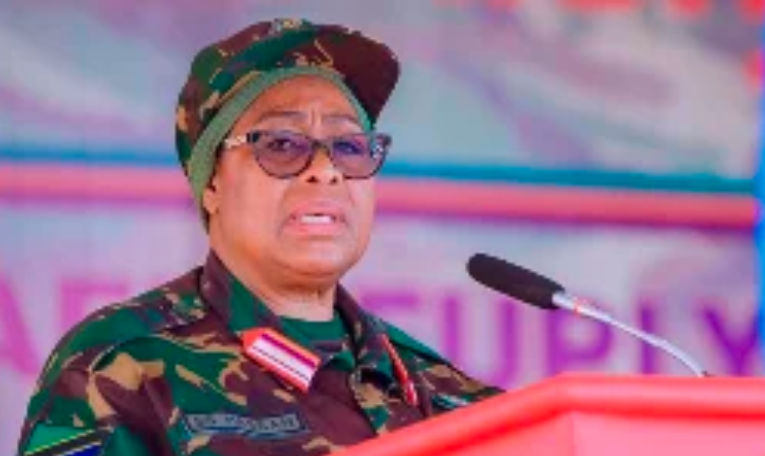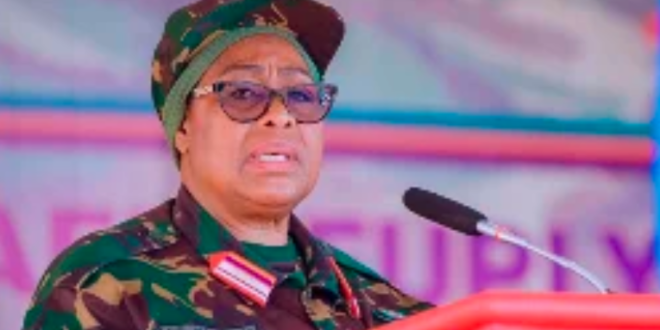Tanzanian President Samia Suluhu Hassan issued a strong warning to foreign diplomats on Tuesday, cautioning them against “interfering” in the country’s internal matters.
This comes amid accusations that Tanzania’s state security agencies are behind a series of abductions and killings of opposition figures, as the nation gears up for local government elections in November.
In her first major statement on the wave of violence, President Samia emphasised that her government is fully capable of addressing the issue without external intervention.
She criticised the statements of condemnation made by several Western diplomatic missions in Tanzania, stating they were unwelcome and violated the 1961 Vienna Convention on Diplomatic Relations.
Article 41 of the convention outlines that diplomats must refrain from interfering in the domestic affairs of the host country.
The president made it clear that Tanzania would not accept directives from foreign nations on how to handle the investigation of politically motivated violence.
This statement followed the escalating violence, most notably the September 6 abduction and murder of Ali Mohamed Kibao, a senior member of the Chadema opposition party.
Kibao was forcibly taken in broad daylight by suspected security agents from a bus near the outskirts of Dar es Salaam.
His lifeless body was found in a nearby bush hours later, with his face partly disfigured by a chemical believed to be acid.
The incident came on the back of a growing number of disappearances, detentions, and beatings involving political and human rights activists in what the United States mission in Dares Salaam described in a September 9 statement as “efforts to disenfranchise citizens ahead of (the) elections.”
The European Union, British and Canadian High Commissions, and Norway and Switzerland embassies also issued a joint statement condemning the trend on September 10.
While the US embassy in Dar called for an “independent, transparent, and prompt investigation” into the incidents, the other five missions called for a “thorough inquiry.”
In a televised speech at an event in Moshi on Tuesday marking the 60th anniversary of the Tanzania Police Force’s formation, President Samia said “outsiders” should not claim to be more pained by the events than Tanzanians themselves.
“It is our own responsibility to find out why they (abductions and killings) are happening at this moment in time. We know what we need to do as a sovereign nation, and do not appreciate other countries telling us to do one, two, or three,” she said.
“I believe these statements were not sanctioned by the heads of state of those countries, but I have my own ways of checking with my fellow presidents, and once I confirm that they were not, I will lodge formal complaints with them.”
Before the diplomatic corps raised concerns, President Samia had already ordered a swift investigation into Ali Mohamed Kibao’s murder, with instructions for the findings to be made public as soon as possible.
Prime Minister Kassim Majaliwa also addressed the matter on Monday, suggesting that while it’s “easy to blame the police,” there could be other hidden forces causing disruptions during election periods.
Chadema party leader Freeman Mbowe has expressed distrust in Tanzanian law enforcement and called for Britain’s Scotland Yard to be involved in the investigation. He emphasised that the party is sceptical about local authorities conducting a “proper and transparent” inquiry.
Chadema has further warned that it will organise nationwide protests if there is no significant progress in the investigation by next week.
Kibao’s killing, along with other violent incidents, has triggered public outrage and intensified concerns about safety as the country prepares for the municipal elections on November 28.
These elections are seen as a prelude to next year’s general election, where President Samia will seek re-election, and the ruling CCM party aims to retain legislative control until 2030.

Source: tigpost
 Home Of Ghana News Ghana News, Entertainment And More
Home Of Ghana News Ghana News, Entertainment And More





